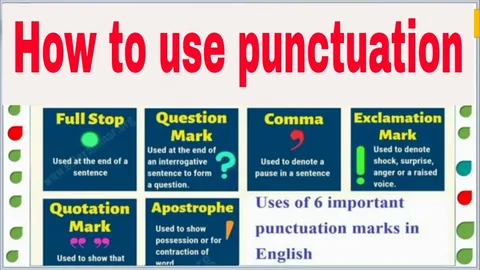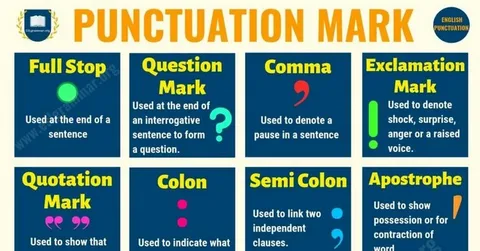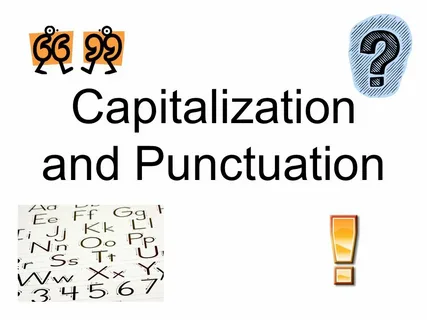Practices in Punctuation and Capitalization with answers
Outline:
- Introduction: Why Are Punctuation and Capitalization Important?
- Common Punctuation Mistakes and How to Fix Them
- Full Stops
- Commas
- Question Marks and Exclamation Points
- Capitalization Rules Everyone Should Know
- Exercises for Punctuation and Capitalization
- Answers to the Exercises
- FAQs
- Conclusion Keep working in order to boost your punctuation abilities and master capitalization.
Introduction: Why Are Punctuation and Capitalization Important?
Have you ever wondered, “Why is punctuation so important? ” or “Why should I make certain terms capitalized? ” If so, then you’re at the right place.
If you do not make use of punctuation correctly, capitalized sentences could become confusing very quickly.
Think about this: how can you tell when a sentence is finished or if a word is one?
The capitalization of punctuation could assist, giving you greater clarity and consistency in the flow of your work.
In this video, we’ll provide everything you need to know about punctuation and capitalization exercises and the solutions.
At the end of the day, you’ll have the basic knowledge but you’ll have plenty of examples to benefit you and expand your knowledge.
Common Punctuation Mistakes and How to Fix Them

Let’s look at the most frequent punctuation-related problems you might encounter and how you could solve these issues.
Full Stops (Periods)
A single of the simplest but most significant punctuation marks.
The expression “full stop” refers to the reality that “full stop” refers to the fact that a full stop is used to end the whole sentence.
- False When I went to the supermarket, I purchased milk.
- It was right After that, I got to the supermarket shop. I then bought milk.
If two ideas can be considered distinct sentences, you must be sure you put closing to each.
Commas
Commas could be a problem. They are an effective way of separating ideas. However, too many can make the sentence look messy.
- Use the commas to differentiate items within the array
Example: I bought apples and oranges in addition to grapes and bananas. - Use an apostrophe in front of any expression (and nevertheless or) to join two separate clauses.
Examples: she loves coffee, but he prefers coffee. - Avoid using the Splicing of commas (when it is required to join two phrases with an apostrophe instead of an apostrophe).
Example: I like reading, and it’s a wonderful method to unwind.
Correction: I enjoy reading. It’s a great way for me to unwind.
Question Marks and Exclamation Points
- Make use of an underscore following an explicit query.
Example: Do you plan to attend the party? - Use Exclamation marks to express your enthusiasm or emphasis, but Don’t overdo it!
Example: That’s amazing!
Capitalization Rules Everyone Should Know
It’s not just about sentences that begin with the capital letter.
It is clear as to how and when to make the most of.
Capitalizing the First Word of a Sentence
A first letter must always be capitalized in the phrase.
Simple, but essential.
Examples: The cat lay on the carpet.
Capitalizing Proper Nouns
Proper names are the names given to certain people, things or places. They always include an uppercase letter.
- People: Sarah, John
- Places: London, Paris
- Brands: Nike, Apple
The Word “I”
Be sure to capitalize your personal pronoun “I,” no matter the place it appears in your sentence.
Examples Today I went to a restaurant for a night out.
Exercises for Punctuation and Capitalization

Now that you’ve grasped the basics, let’s check your understanding by doing certain exercises.
Be sure not to worry; you’ll be able to find the answer soon after you’ve had a chance to determine if you’ve got the answer correctly!
1. Insert punctuation properly.
- I love pizza; it’s my favorite food
- Where are you next week?
- Are you able to imagine it? I have won the lottery.
- She bought apples, oranges, and bananas
- My most loved books include The Hobbit Harry Potter and To Kill a Mockingbird
exercise 2: Corrections to capitalization.
- I visited London at one time.
- She remarked, “let’s go to the park. “
- Mr. Johnson is my teacher.
- We took a tour of the Eiffel building during our visit to Paris.
- I’m a big lover of summer, but Christmas is my favorite holiday.
Answers to the Exercises
Exercise 1 Answers:
- I love pizza; it’s my favorite food.
- Where are you heading to tomorrow?
- Do you be sure? I was the lucky winner!
- She bought apples, oranges, as well as bananas.
- My most loved books include The Hobbit, Harry Potter, and To Kill a Mockingbird.
Exercise 2 Answers:
- The year before I went to London the year before.
- She said, “Let’s go to the park. “
- “Hi, Mr. Johnson. Johnson is my teacher.
- We visited the Eiffel Tower, located in Paris.
- I’m a big fan of summer. Christmas is my absolute favorite holiday.
FAQs
The reason why punctuation is important?
Punctuation is used to clearly convey the nature and meaning that writing follows. If it is not utilized, the sentences could be difficult to understand and to read.
What is the most frequently occurring punctuation mistake?
Commas are an enormous issue. There are many who scatter in commas throughout. Be careful so that your work becomes more evident.
What is the accurate time to use the capital letter?
Be sure that you capitalize the first word in a phrase that contains proper adjectives (names or places) and also a pronoun “I. “
Does punctuation change the significance of an expression?
Absolutely!
Example:
- “Let’s eat, Grandma! “
- “Let’s eat Grandma! “
Punctuation is a means to improve the lives of people (or at the very minimum, change the meaning!).
Conclusion: Keep working to master capitalization and punctuation.

If you’re looking to improve your writing abilities, being aware of punctuation and capitalization issues and their solutions are essential.
The information might seem small, but it can be significant to the quality of your message.
Keep practicing. Re-visit these exercises, then test them repeatedly, and eventually satisfyingly, you will be an expert in punctuation capitalization!
Remember, it is an art skill that improves with each time you work on it. Every capital letter, comma, and full stop will help you get closer to becoming a better writer.
finest chance.




